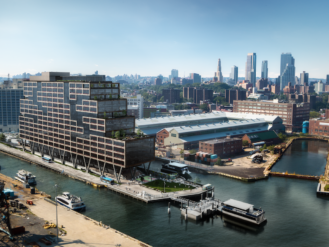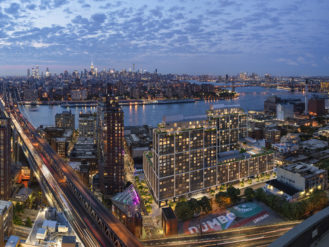Hot Property: Apple, Domino, Bedford-Union, and $1 Rent
It's all about real estate and retail in this week's roundup of the latest Brooklyn business news
The new Apple store in Downtown Brooklyn, the second one to open in the borough (Photo by Steve Koepp)
Apple is opening Brooklyn store No. 2 in a very convenient spot: Downtown. A vaulting makeover for the Domino Sugar refinery gets an OK, as does the hotly controversial redevelopment of the Bedford-Union Armory. A real-estate pro gives the lowdown on Brooklyn trends, while we investigate the “high-rent blight” of empty storefronts. A full-scale supermarket is coming to Dumbo. The New Yorker calls food halls an overhyped economic phenomenon. Industrial companies are leaving Williamsburg, cashing in their property to head for cheaper frontiers. A new co-working space in Park Slope has a sweet deal for local journalists: a $1 membership fee. And a small variety store in Ditmas Park shows you don’t have to be Macy’s to put on a festive holiday store-window display.
1. An Apple Store finally lands in Downtown Brooklyn
Of Apple’s nine stores in New York City, only one is in the city’s most populated borough. Brooklynites who’ve long wondered what’s up with that may get a measure of satisfaction starting at 10 a.m. on Saturday, when the second Brooklyn store opens downtown, at 123 Flatbush Ave. The store will have Apple’s trademark glassy grandeur, situated in the prow of the triangle-shaped building that houses 300 Ashland, the deluxe new residential building across the street from the Brooklyn Academy of Music.
The new store is centrally located, almost to a fault, with Flatbush traffic rumbling outside and five subway lines running underneath. Apple has addressed that challenge architecturally, installing a sound-absorbing timber canopy outside the store and an inside floor isolated from the rest of the structure, Apple marketing director Jason Barlia told Apple Insider. Inside the store will be a “Genius Grove,” where Apple’s customer-helpers will dispense advice at tables surrounded by potted ficus trees. The store will reportedly have about 160 employees.
2. The Domino Factory makeover: glassy inside, gritty outside

(Rendering courtesy of Two Trees Management)
Transforming the old, brick Domino Sugar Refinery into a functionally modern office building was always going to be a challenge, but more so than expected. The windows across its several façades were misaligned, the building had no traditional floor structures, and the interior was light-starved. But architect Vishaan Chakrabarti managed to solve that puzzle with a plan to install a modern, glassy structure inside the old shell, with room between the two structures for light and air to pass. Crowning the top will be a crystalline, barrel-vaulted structure that resonates with the style of the building.
The plan by Two Trees Management, the developer of the site, was approved this week by the Landmarks Preservation Commission, affirming what was already good buzz about the design. The ambition of the architects, noted critic Justin Davidson in New York, “was not to outdazzle the refinery, or to fix it up with apologetic tinkering, but to reveal its pocked and pitted splendor with one precise gesture.” When complete, the 400,000 sq. ft. structure is expected to house thousands of workers. The overall 11-acre development will include four residential buildings and a six-acre waterfront park.
3. An insider’s take on Brooklyn’s real-estate boom
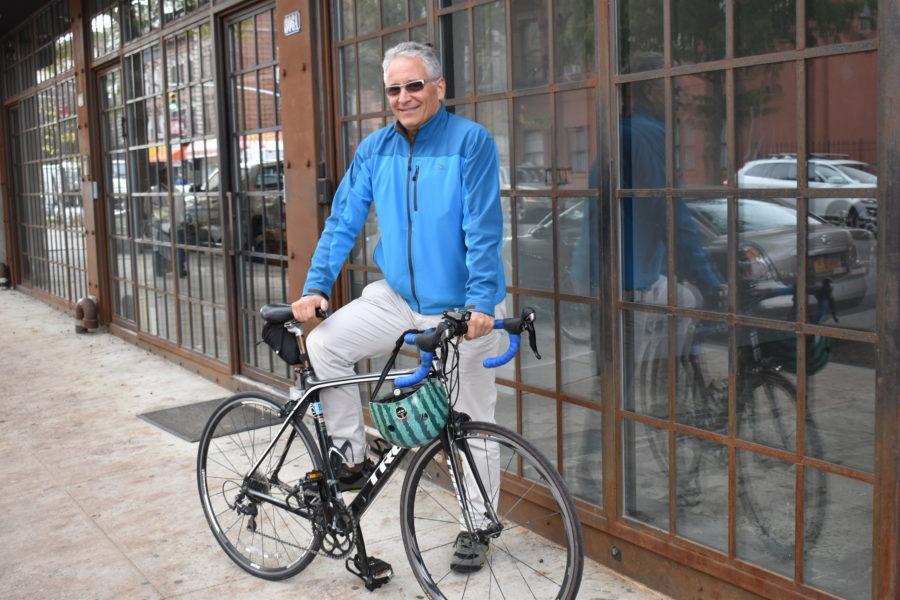
(Photo by Steve Koepp)
Max Dobens, Douglas Elliman Real Estate’s head of sales in the borough, gives the lowdown on prices, competition and changing neighborhoods in a Q&A with The Bridge. Among his observations: “One of my biggest surprises when I came to Brooklyn was the aggressive recruiting and attempted poaching of agents, as opposed to the city. The companies want to be in Brooklyn because you have to be, and there’s a limited pool of experienced, quality agents here. It’s fiercer.” Read more. [The Bridge]
4. Inside the blight of empty Brooklyn storefronts
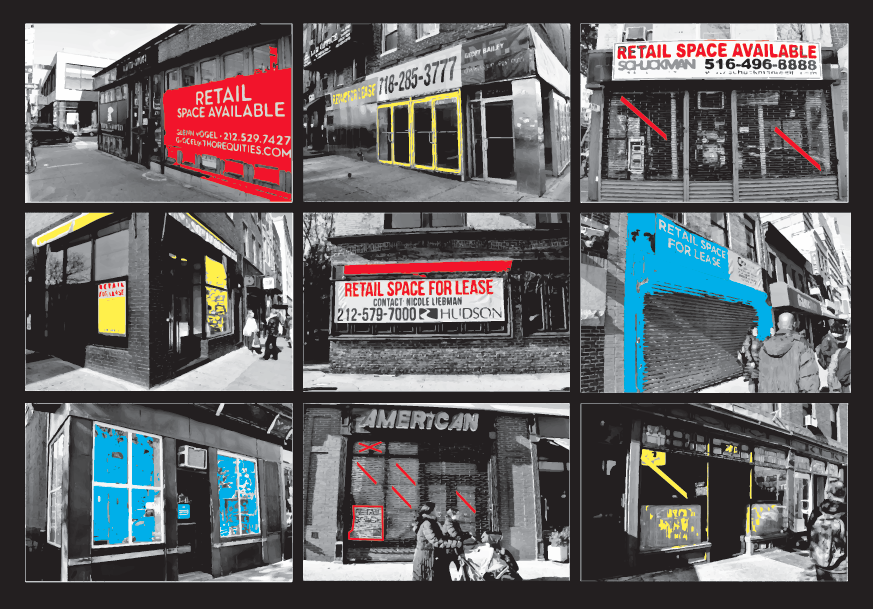
(Illustration by Heather Jones)
When seeing another storefront papered over, most Brooklynites cast blame with a handy epithet: Greedy landlords! True enough in many cases, but the causes are more complicated. They include rapidly rising property values, retiring shop owners cashing out of their properties, strict mortgage terms by banks, the arrival of major chains and e-commerce, and the stalling of legislative proposals to help small business survive. In our in-depth report, contributor Daniel Roberts explores the causes and possible cures for Brooklyn’s case of so-called “affluent blight.” Read more. [The Bridge]
5. Council vote approves Bedford-Union Armory redevelopment
Spectators screaming “Kill the Deal!” and “The city is not for sale!” were led from the City Council chambers on Thursday after disrupting the full Council vote on the Bedford-Union Armory redevelopment proposal. Once the gallery was emptied, however, the Council overwhelmingly approved the plan to redevelop the Crown Heights site. Read more. [Brooklyn Daily Eagle]
6. Co-working space for $1, if you're an unemployed scribe
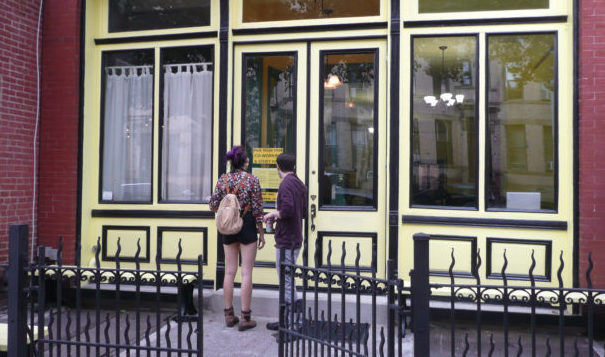
(Photo courtesy of Park Slope Desk)
If anyone deserves a new place to hang their hat, and perch their laptop, it’s the former journalists of Gothamist and DNAinfo, who became suddenly unemployed when their sites were abruptly shut down this month. To the rescue comes a new co-working place, Park Slope Desk, which is offering the jobless journalists $1 subscriptions for the winter season. (Journalists working for still-functioning local publications can get the special rate too.) Normally the rates are $100 to $350, depending on the size of the desk and the hours needed.
The proprietor of the new space on 11th Street is Cosmo Lee, who owns the property and years ago operated the Blah Blah Lounge in the space. “Media such as the Daily News and the New York Times have slashed street-level reporting, and important stories that do wind up being carried by large publications are often first uncovered by local journalists,” Lee said in announcing the new space. “They play such an essential role, covering community events and holding our local authorities accountable.”
7. Groceries on the way: Dumbo to get a full-sized supermarket
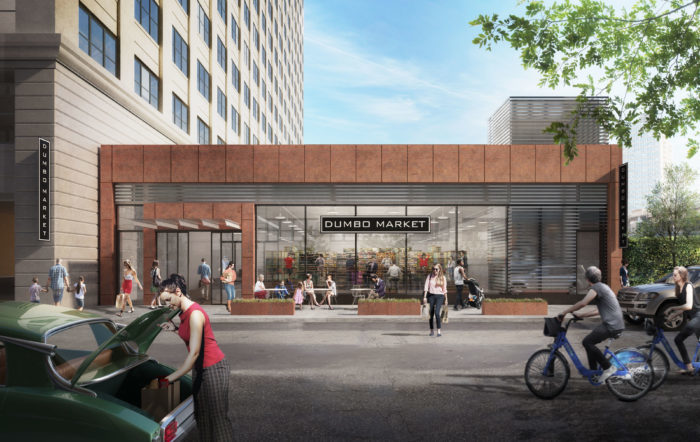
(Rendering courtesy of Two Trees Management)
Dumbo, which has spectacular views and a budding restaurant scene, has never been overflowing with choices for an everyday need: grocery shopping. That will change with two new entries, one big and one pocket-sized. The neighborhood’s first full-sized supermarket, Dumbo Market, will be arriving in a 16,000 sq. ft. space at 66 Front St. in early 2018, Dumbo-based developer Two Trees Management announced this month. The gourmet emporium will be owned and operated by the family that launched Brooklyn Harvest Market in Williamsburg. More immediately, a kind of artisanal deli called Superette opened this week at 145 Front St. Calling itself “the miniest mart,” it offers soups, salads and sandwiches, among other grab-and-go choices.
8. The inflated promise of the American food hall

(Photo by Colin Clark)
“In contrast to the food court, with its Auntie Anne’s and Panda Express, the food hall eschews big chains in favor of local, artisanal purveyors, dazzling the visitor with a vision of a thriving economy of small businesses operating side by side. It is tempting, therefore, to see the proliferation of the food hall as a victory for the little guy. This is not entirely accurate,” reports The New Yorker. Read more. [The New Yorker]
9. Williamsburg’s industrial businesses are fleeing
While City Hall works on a plan to preserve manufacturing in East Williamsburg, the gentrification buzzsaw is already taking its toll. Read more. [Village Voice]
10. You don’t have to be Macy’s to have a festive store window
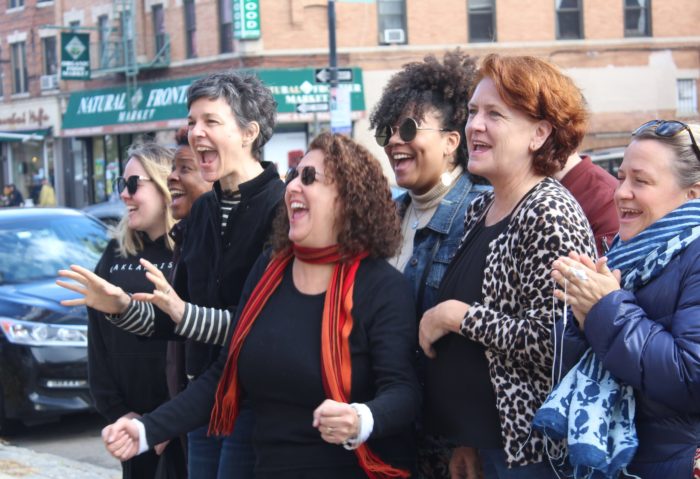
(Photo by Arden Phillips)
Earlier this week, we reported about the problem of empty storefronts popping up in Brooklyn. But this is a different kind of retail story, about a storefront in Ditmas Park that’s bringing holiday cheer to passersby and even passengers on the city buses that rumble past the store. Here’s how they did it, with a little help. Read more. [The Bridge]






